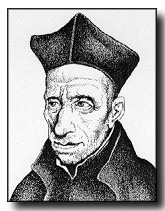Francisco Suarez (1548-1617)
- ACTON INSTITUTE
"...if a legitimate prince governs tyrannically and no other means of self-defence can be found than the expulsion and deposition of the king, then the people, acting as a whole...may depose him."
 |
Francisco
Suarez
(1548-1617) |
During the sixteenth century, a mixing of the profane and the sacred took place in the political scene characterized by the appearance of the doctrine of Divine Right of Kings. Throughout mostly northern Europe, and particularly in France, monarchs were demanding for themselves divine sovereignty just as the church had claimed divine moral authority. What occurred was a divinization of the state in which the monarch claimed to be answerable to neither church nor his subjects but to God alone.
Against such defenders of Divine Right, like King James I of England, Francisco Suarez sought to defend the sacred institutions against a secular perversion that threatened the integrity of both church and state. Suarez, a Jesuit priest and professor of theology at the University of Salamanca in Spain, believed that no monarch could possess attributes of the sacred.
Suarez argued that the church was the only institution established through divine intervention by an immediate act of Christ and thus truly of divine right. The authority of the state is not of divine but of human origin. It is the people who consent to be governed by the political authority, not from God directly. Thus the people, in extreme cases, may depose their king.
The church's object is the health of each individual soul and its spiritual salvation, as opposed to the state whose jurisdiction is solely temporal, concerned with the common good in secular life. Given the primacy of the spiritual over the temporal, the church is thus superior to the state. This does not mean, however, that the church has unrestricted temporal power. The pope's legitimate authority lay in spiritual and theological, rather than secular and political, matters. The major works of Francisco Suarez include De Legibus on law and Defensor Fidei, a defense of the church against King James I.
 This is Meaghen Gonzalez, Editor of CERC. I hope you appreciated this piece. We curate these articles especially for believers like you.
This is Meaghen Gonzalez, Editor of CERC. I hope you appreciated this piece. We curate these articles especially for believers like you.
Please show your appreciation by making a $3 donation. CERC is entirely reader supported.

Acknowledgement
"Francisco Suarez (1548-1617)." In the Liberal Tradition: A History of Liberty by the Acton Institute.
In the Liberal Tradition: A History of Liberty is a collection of short biographies highlighting the life and thought of central characters in the history of liberty.
This article is reprinted with permission from the Acton Institute.




